New fishway project for Jolimont Creek, expanded seagrass nursery in Airlie Beach
An aquatic project is set to make a splash for Mackay’s fish population and local tourism, while an expanded seagrass nursery in the Whitsundays will cut carbon, save turtles and protect the reef.

Mackay
Don't miss out on the headlines from Mackay. Followed categories will be added to My News.
An exciting new fishway project is expected to turn the tide for Mackay’s aquatic population and ecosystem health, and create a ripple effect that also promises benefits for local tourism.
Jolimont Creek, at Mount Ossa, is earmarked for an upgrade after being identified as a significant barrier to fish migration in the region.
As such a plan is in play to retrofit a rock ramp fishway to an existing barrier to fish migration.
The design, which mimics natural river cascades, will facilitate the migration of species like barramundi between the creek’s upper and lower reaches.
Catchment Solutions’ Fisheries Ecologist Matt Moore said the Jolimont Creek Fishway was identified as a high-priority project in 2019 and was expected to “significantly improve fish stocks and biodiversity in the region”.
“This innovative design mimics the natural cascades of a river and will be built using rocks to create a series of small pools and riffles at regular intervals,” Mr Moore said.

“This configuration allows fish, particularly diadromous species (fish that migrate between the sea and freshwater to breed) such as barramundi, to navigate around the weir and continue their migration.”
The initiative was set to make waves for the region with Mayor Greg Williamson lauding the innovative project for its long term benefits for both the ecosystem and tourism in the region.
“This project will not only boost fish populations in the Seaforth and St Helens areas but will also enhance recreational fishing opportunities, which are crucial for our tourism industry and local economy,” Mayor Williamson said.
“By improving fish passage in Jolimont Creek, we are taking an important step towards maintaining healthy fish populations and ensuring sustainable fishing for future generations,” he said.
Reef Authority spokeswoman Rebecca Allen said the fishway project held particular importance as Jolimont Creek was a tributary of Murray Creek, a major system within the catchment of the St Helens Beach to Cape Hillsborough Net Free Fishing Zone.
“As the project progresses, it promises to play a vital role in maintaining a healthy and resilient aquatic ecosystem in Jolimont Creek,” she said.

This comes as CQUniversity and Great Barrier Reef Foundation officially unveiled a new expanded seagrass nursery at Airlie Beach.
Coastal Marine Ecosystem Research Centre director Professor Emma Jackson said the new expanded nursery would play a crucial role in seagrass restoration in the region.

“The new nursery is three times larger than the pilot nursery and will enhance our capacity for seagrass restoration, but also have more accessibility for local community, schools and tourists to visit and learn about this important habitat,” Professor Jackson said.
The nursery is part of the Great Barrier Reef Foundation’s Reef Islands Initiative Whitsunday Seagrass restoration Project and is a partnership with the Great Barrier Reef Foundation, CQUniversity, Reef Catchments, the Coral Sea Marina Resort and Ngaro and Gia Traditional Owners.
GBRF’s Reef Islands Initiative senior program manager Clarissa Elakis said the importance of seagrass to the Great Barrier Reef could not be overstated.
“The Pioneer Bay seagrass meadows are an important nursery and food source for endangered species like the turtle and dugong and help filter pollutants like fine sediment and nutrients from the water,” she said.
“But they also have another critical job – mitigating climate change by storing carbon.”
Ms Elakis said as climate continued to change, the Reef’s seagrass meadows struggled to recover from increasingly severe and frequent cyclones like Cyclone Ului and Cyclone Debbie in 2010 and 2017.
“The new expanded seagrass nursery will give local seagrass meadows an additional boost toward recovery,” she said.
More Coverage
Originally published as New fishway project for Jolimont Creek, expanded seagrass nursery in Airlie Beach









